Food for thoughts
Compliance and Regulation Law bilingual Dictionnary
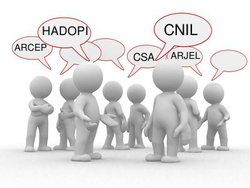
The Independent Administrative Authority (IAA) is the legal form that the legislator has most often chosen to build regulatory authorities. The IAA is only its legal form, but French law has attached great importance to it, following the often formalistic tradition of public law. They are thus independent administrative authorities, especially in the legal systems of continental law like France, Germany or Italy.
The essential element is in the last adjective: the "independent" character of the organism. This means that this organ, which is only administrative so has a vocation to be placed in the executive hierarchy, does not obey the Government. In this, regulators have often been presented as free electrons, which posed the problem of their legitimacy, since they could no longer draw upstream in the legitimacy of the Government. This independence also poses the difficulty of their responsibility, the responsibility of the State for their actions, and the accountability of their use of their powers. Moreover, the independence of regulators is sometimes questioned if it is the government that retains the power to appoint the leaders of the regulatory authority. Finally, the budgetary autonomy of the regulator is crucial to ensure its independence, although the authorities having the privilege of benefiting from a budget - which is not included in the LOLF - are very few in number. They are no longer referred to as "independent administrative authorities" but as "Independent Public Authorities", the legislator making a distinction between the two (French Law of 20 January 2017).
The second point concerns the second adjective: that it is an "administrative" body. This corresponds to the traditional idea that regulation is the mechanism by which the State intervenes in the economy, in the image of a kind of deconcentration of ministries, in the Scandinavian model of the agency. If we allow ourselves to be enclosed in this vocabulary, we conclude that this administrative body makes an administrative decision which is the subject of an appeal before a judge. Thus, in the first place, this would be a first instance appeal and not a judgment since the administrative authority is not a court. Secondly, the natural judge of the appeal should be the administrative judge since it is an administrative decision issued by an administrative authority. But in France the Ordinance of 1 December 1986 sur la concurrence et la libéralisation des prix (on competition and price liberalization), because it intended precisely to break the idea of an administered economy in order to impose price freedom on the idea of economic liberalism, required that attacks against the decisions of economic regulators taking the form of IAA are brought before the Court of Appeal of Paris, judicial jurisdiction. Some great authors were even able to conclude that the Paris Court of Appeal had become an administrative court. But today the procedural system has become extremely complex, because according to the IAA and according to the different kinds of decisions adopted, they are subject to an appeal either to the Court of Appeal of Paris or to the Conseil d'État (Council of State) . If one observes the successive laws that modify the system, one finds that after this great position of principle of 1986, the administrative judge gradually takes again its place in the system, in particular in the financial regulation. Is it logical to conclude that we are returning to a spirit of regulation defined as an administrative police and an economy administered by the State?
Finally, the third term is the name itself: "authority". It means in the first place an entity whose power holds before in its "authority". But it marks that it is not a jurisdiction, that it takes unilateral decisions. It was without counting the European Court of Human Rights (ECHR) and the judicial judge! Indeed, Article 6§1 of the European Convention on Human Rights states that everyone has the right to an impartial tribunal in civil and criminal matters. The notion of "criminal matter" does not coincide with the formal traditional concept of criminal law but refers to the broad and concrete factual concept of repression. Thus, by a reasoning which goes backwards, an organization, whatever the qualification that a State has formally conferred on it, which has an activity of repression, acts "in criminal matters". From this alone, in the European sense, it is a "tribunal". This automatically triggers a series of fundamental procedural guarantees for the benefit of the person who is likely to be the subject of a decision on his part. In France, a series of jurisprudence, both of the Cour de cassation (Court of Cassation), the Conseil d'État (Council of State) or the Conseil constitutionnel (Constitutional Council) has confirmed this juridictionnalization of the AAI.
Thesaurus : Doctrine
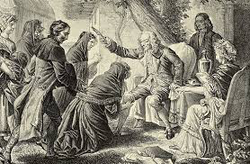
J’ai dévoré, mon cher ami, le nouveau mémoire de M. de Beaumont sur l’innocence des Calas ; je l’ai admiré, j’ai répandu des larmes, mais il ne m’a rien appris ; il y a longtemps que j’étais convaincu ; et j’avais eu le bonheur de fournir les premières preuves.
Vous voulez savoir comment cette réclamation de toute l’Europe contre le meurtre juridique du malheureux Calas, roué à Toulouse, a pu venir d’un petit coin de terre ignoré, entre les Alpes et le Mont-Jura, à cent lieues du théâtre où se passa cette scène épouvantable.
Rien ne fera peut-être mieux voir la chaîne insensible qui lie tous les évènements de ce malheureux monde.
Sur la fin de mars 1762, un voyageur qui avait passé par le Languedoc, et qui vint dans ma retraite à deux lieues de Genève, m’apprit le supplice de Calas, et m’assura qu’il était innocent. Je lui répondis que son crime n’était pas vraisemblable, mais qu’il était moins vraisemblable encore que des juges eussent, sans aucun intérêt, fait périr un innocent par le supplice de la roue.
J’appris le lendemain qu’un des enfants de ce malheureux père s’était réfugié en Suisse, assez près de ma chaumière. Sa fuite me fit présumer que la famille était coupable. Cependant je fis réflexion que le père avait été condamné au supplice comme ayant seul assassiné son fils pour la religion, et que ce père était mort âgé de soixante-neuf ans. Je ne me souviens pas d’avoir jamais lu qu’aucun vieillard eût été possédé d’un si horrible fanatisme. J’avais toujours remarqué que cette rage n’attaquait d’ordinaire que la jeunesse, dont l’imagination ardente, tumultueuse, et faible s’enflamme par la superstition. Les fanatiques des Cévennes étaient des fous de vingt à trente ans, stylés à prophétiser dès l’enfance. Presque tous les convulsionnaires que j’avais vu à Paris en très grand nombre étaient de petites filles et de jeunes garçons. Les vieillards chez les moines sont moins emportés, et moins susceptibles des fureurs du zèle, que ceux qui sortent du noviciat. Les fameux assassins, armés par le fanatisme, ont tous été de jeunes gens, de même que tous ceux qui ont prétendu être possédés ; jamais on n’a vu exorciser un vieillard. Cette idée me fit douter d’un crime qui d’ailleurs n’est guère dans la nature. J’en ignorais les circonstances.
Je fis venir le jeune Calas chez moi. Je m’attendais à voir un énergumène tel que son pays en a produit quelquefois. Je vis un enfant simple, ingénu, de la physionomie la plus douce et la plus intéressante, et qui, en me parlant, faisait des efforts inutiles pour retenir ses larmes. Il me dit qu’il était à Nîmes en apprentissage chez un fabricant, lorsque la voix publique lui avait appris qu’on allait condamner dans Toulouse toute sa famille au supplice, que presque tout le Languedoc la croyait coupable, et que, pour se dérober à des opprobres si affreux, il était venu se cacher en Suisse.
Je lui demandai si son père et sa mère étaient d’un caractère violent : il me dit qu’ils n’avaient jamais battu un seul de leurs enfants, et qu’il n’y avait point de parents plus indulgents et plus tendres.
J’avoue qu’il ne m’en fallut pas davantage pour présumer fortement l’innocence de la famille. Je pris de nouvelles informations de deux négociants de Genève, d’une probité reconnue, qui avaient logé à Toulouse chez Calas. Ils me confirmèrent dans mon opinion. Loin de croire la famille Calas fanatique et parricide, je crus voir que c’étaient des fanatiques qui l’avaient accusée et perdue. Je savais depuis longtemps de quoi l’esprit de parti et la calomnie sont capables.
Mais quel fut mon étonnement lorsque, ayant écrit en Languedoc sur cette étrange aventure, catholiques et protestants me répondirent qu’il ne fallait pas douter du crime des Calas ! Je ne me rebutai point. Je pris la liberté d’écrire à ceux mêmes qui avaient gouverné la province, à des commandants de provinces voisines, à des ministres d’État ; tous me conseillèrent unanimement de ne me point mêler d’une si mauvaise affaire ; tout le monde me condamna, et je persistai : voici le parti que je pris.
La veuve de Calas, à qui, pour comble de malheur et d’outrage, on avait enlevé ses filles, était retirée dans une solitude où elle se nourrissait de ses larmes, et où elle attendait la mort. Je ne m’informai point si elle était attachée ou non à la religion protestante, mais seulement si elle croyait un Dieu rémunérateur de la vertu et vengeur des crimes. Je lui fis demander si elle signerait au nom de ce Dieu que son mari était mort innocent ; elle n’hésita pas. Je n’hésitai pas non plus. Je priai M. Mariette de prendre au conseil du roi sa défense. Il fallait tirer madame Calas de sa retraite, et lui faire entreprendre le voyage de Paris.
On vit alors que s’il y a de grands crimes sur la terre, il y a autant de vertus ; et que si la superstition produit d’horribles malheurs, la philosophie les répare.
Une dame dont la générosité égale la haute naissance, qui était alors à Genève pour faire inoculer ses filles, fut la première qui secourut cette famille infortunée. Des Français retirés en ce pays la secondèrent ; des Anglais qui voyageaient se signalèrent ; et, comme dit M. de Beaumont, il y eut un combat de générosité entre ces deux nations, à qui secourrait le mieux la vertu si cruellement opprimée.
Le reste, qui le sait mieux que vous ? Qui a servi l’innocence avec un zèle plus constant et plus intrépide ? Combien n’avez-vous pas encouragé la voix des orateurs, qui a été entendue de toute la France et de l’Europe attentive ? Nous avons vu renouveler les temps où Cicéron justifiait, devant une assemblée de législateurs, Amerinus accusé de parricide. Quelques personnes, qu’on appelle dévotes, se sont élevées contre les Calas ; mais, pour la première fois depuis l’établissement du fanatisme, la voix des sages les a fait taire.
La raison remporte donc de grandes victoires parmi nous ! Mais croiriez-vous, mon cher ami que la famille des Calas, si bien secourue, si bien vengée, n’était pas la seule alors que la religion accusât d’un parricide, n’était pas la seule immolée aux fureurs du préjugé ? Il y en a une plus malheureuse encore, parce qu’éprouvant les mêmes horreurs, elle n’a pas eu les mêmes consolations ; elle n’a point trouvé des Mariette, des Beaumont, et des Loiseau.
Il semble qu’il y ait dans le Languedoc une furie infernale amenée autrefois par les inquisiteurs à la suite de Simon de Montfort, et que depuis ce temps elle secoue quelquefois son flambeau.
Un feudiste de Castres, nommé Sirven, avait trois filles. Comme la religion de cette famille est la prétendue réformée, on enlève, entre les bras de sa femme, la plus jeune de leurs filles. On la met dans un couvent, on la fouette pour lui mieux apprendre son catéchisme ; elle devient folle, elle va se jeter dans un puits, à une lieue de la maison de son père. Aussitôt les zélés ne doutent pas que le père, la mère et les sœurs n’aient noyé cette enfant. Il passait pour constant, chez les catholiques de la province, qu’un des points capitaux de la religion protestante est que les pères et mères sont tenus de pendre, d’égorger ou de noyer tous leurs enfants qu’ils soupçonneront avoir quelque penchant pour la religion romaine. C’était précisément le temps où les Calas étaient aux fers, et où l’on dressait leur échafaud.
L’aventure de la fille noyée parvient incontinent à Toulouse. Voilà un nouvel exemple, s’écrie-t-on, d’un père et d’une mère parricides. La fureur publique s’en augmente ; on roue Calas, et on décrète Sirven, sa femme et ses filles. Sirven épouvanté n’a que le temps de fuir avec toute sa famille malade. Ils marchent à pied, dénués de tout secours, à travers des montagnes escarpées, alors couvertes de neige. Une de ses filles accouche parmi les glaçons ; et, mourante, elle emporte son enfant mourant dans ses bras : ils prennent enfin leur chemin vers la Suisse.
Le même hasard qui m’amena les enfants de Calas veut encore que les Sirven s’adressent à moi. Figurez-vous, mon ami, quatre moutons que des bouchers accusent d’avoir mangé un agneau ; voilà ce que je vis. Il m’est impossible de vous peindre tant d’innocence et tant de malheurs. Que devais-je faire, et qu’eussiez-vous fait à ma place ? Faut-il s’en tenir à gémir sur la nature humaine ? Je prends la liberté d’écrire à monsieur le premier président de Languedoc, homme vertueux et sage ; mais il n’était point à Toulouse. Je fais présenter par un de vos amis un placet à monsieur le vice-chancelier. Pendant ce temps-là, on exécute vers Castres, en effigie, le père, la mère, les deux filles ; leur bien est confisqué, dévasté, il n’en reste plus rien.
Voilà toute une famille honnête, innocente, vertueuse, livrée à l’opprobre et à la mendicité chez les étrangers : ils trouvent de la pitié, sans doute ; mais qu’il est dur d’être jusqu’au tombeau un objet de pitié ! On me répond enfin qu’on pourra leur obtenir des lettres de grâce. Je crus d’abord que c’était de leurs juges qu’on me parlait, et que ces lettres étaient pour eux. Vous croyez bien que la famille aimerait mieux mendier son pain de porte en porte, et expirer de misère, que de demander une grâce qui supposerait un crime trop horrible pour être graciable ; mais aussi comment obtenir justice ? Comment s’aller remettre en prison dans sa patrie où la moitié du peuple dit encore que le meurtre de Calas était juste ? Ira-t-on une seconde fois demander une évocation au conseil ? Tentera-t-on d’émouvoir la pitié publique, que l’infortune des Calas a peut-être épuisée, et qui se lassera d’avoir des accusations de parricide à réfuter, des condamnés à réhabiliter, et à des juges à confondre ?
Ces deux évènements tragiques, arrivés coup sur coup, ne sont-ils pas, mon ami, des preuves de cette fatalité inévitable à laquelle notre misérable espèce est soumise ? Vérité terrible, tant enseignée dans Homère et dans Sophocle ; mais vérité utile, puisqu’elle nous apprend à nous résigner et à savoir souffrir.
Vous dirai-je que, tandis que le désastre étonnant des Calas et des Sirven affligeait ma sensibilité, un homme, dont vous devinerez l’état à ses discours, me reprocha l’intérêt que je prenais à deux familles qui m’étaient étrangères ? De quoi vous mêlez-vous ? me dit-il ; laissez les morts ensevelir leurs morts. Je lui répondis : J’ai trouvé dans mes déserts l’Israélite baigné dans son sang, souffrez que je répande un peu d’huile et de vin sur ses blessures : vous êtes lévite, laissez-moi être Samaritain.
Il est vrai que pour prix de mes peines on m’a bien traité en Samaritain ; on a fait un libelle diffamatoire sous le nom d’Instruction pastorale et de Mandement ; mais il faut l’oublier, c’est un jésuite qui l’a composé. Le malheureux ne savait pas alors que je donnais un asile à un jésuite. Pouvais-je mieux prouver que nous devons regarder nos ennemis comme nos frères.
Vos passions sont l’amour de la vérité, l’humanité, la haine de la calomnie. La conformité de nos caractères a produit notre amitié. J’ai passé ma vie à chercher, à publier cette vérité que j’aime. Quel autre des historiens modernes a défendu la mémoire d’un grand prince contre les impostures atroces de je ne sais quel écrivain qu’on peut appeler le calomniateur des rois, des ministres, et des grands capitaines, et qui cependant aujourd’hui ne peut trouver un lecteur ?
Je n’ai donc fait, dans les horribles désastres des Calas et des Sirven, que ce que font tous les hommes ; j’ai suivi mon penchant. Celui d’un philosophe n’est pas de plaindre les malheureux, c’est de les servir.
Je sais avec quelle fureur le fanatisme s’élève contre la philosophie. Elle a deux filles qu’il voudrait faire périr comme Calas, ce sont la Vérité et la Tolérance ; tandis que la philosophie ne veut que désarmer les enfants du fanatisme, le Mensonge et la Persécution.
Des gens qui ne raisonnent pas ont voulu décréditer ceux qui raisonnent : ils ont confondu le philosophe avec le sophiste ; ils se sont bien trompés. Le vrai philosophe peut quelquefois s’irriter contre la calomnie, qui le poursuit lui-même ; il peut couvrir d’un éternel mépris le vil mercenaire qui outrage deux fois par mois la raison, le bon goût, et la vertu : il peut même livrer, en passant, au ridicule ceux qui insultent à la littérature dans le sanctuaire où ils auraient dû l’honorer : mais il ne connaît ni les cabales, ni les sourdes pratiques, ni la vengeance. Il sait, comme le sage de Montbar, comme celui de Vore rendre la terre plus fertile, et ses habitants plus heureux. Le vrai philosophe défriche les champs incultes, augmente le nombre des charrues, et par conséquent des habitants ; occupe le pauvre et l’enrichit ; encourage les mariages, établit l’orphelin ; ne murmure point contre des impôts nécessaires, et met le cultivateur en état de les payer avec allégresse. Il n’attend rien des hommes, et il leur fait tout le bien dont il est capable. Il a l’hypocrite en horreur, mais il plaint le superstitieux ; enfin il sait être ami.
Je m’aperçois que je fais votre portrait, et qu’il n’y manquerait rien si vous étiez assez heureux pour habiter la campagne.
Compliance and Regulation Law bilingual Dictionnary

The distinction between "Public Law" and "Private Law" is important. In the systems of Continental Law, or still called under Roman-Germanic Law, or even called Civil Law systems, it is even around it that legal systems are built: it can be a basic distinction, a summa divisio, as it it in the Civil Law systems. In the so-called Common Law or Anglo-American systems, the distinction is less fundamental, but it remains, justifying in particular that the rules and disputes concerning the administration call for special rules and are apprehended by special tribunals.
In principle, this distinction is based on the nature of the persons whose legal situation is examined. Under"Public Law" a legal situation involving a person who is itself a public-law entity: the State, a local authority, a public undertaking, etc. That is why, for example, the contract which may be concluded will be of public law, and the judge who may be seized of it will be an administrative court. If the situation does not involve a person governed by public law, then it will be governed by "Private Law". There are a thousand exceptions, but this is the starting and basic and fondamental principle.
Two essential remarks, bearing a system of values, explaining that the systems of Civil Law and Common Law are in fact confronting each other.
The two bodies of rules and institutions are not of equal strength because one of the categories is "closed", corresponding to one criterion (the "public person"), while the other is open: Public Law is a closed category; on the contrary, Private law becomes "active" as soon as there is no public person (a "private person" who or which must define himself or itself as a "non-public person").
One can consider this articulation between Public Law and Private Law in two ways, radically opposed. It may express a mark of inferiority in disfavour of private law: we are all "ordinary" persons in "ordinary" situations with "ordinary" activities (this will be the French conception ....). On the contrary, Public Law is the mark of the State, of Public Order, of Sovereignty, of public power, of the general will, in the interstices of which individuals slip in to act and satisfy their small particular interests
On the contrary, Private Law can be considered as the expression of the "common law": people are free and do what they want, through ownership and contract. As an exception and because they have elected people to do so, the rulers (whom they control), by exception, enact norms that constrain them. But this is an exception, since repression - public law and criminal law, which has the same status in this respect - is only a tribute to the freedom of persons, since this freedom remains wholly in the form of the private enterprise on the market.
It is then measured that the articulation between Public and Private Law profoundly reflects a philosophy and a political position. If it is considered that Regulation is the underlying order by which the Sovereign allows the deployment of his subjects who also benefit from a long-term policy constructed by the autonomous and measured political will, then Public Law in Is the master, the Regulation Law expressing a renewed search for efficiency, this but only this. If we believe that Regulation is whereby economic rationality manages to protect persons and companies from risks and to compensate for market failures, a market whose liberal principle remains the ideal, then Private Law is the core, whith contract and private property as basis tools.
France and the Latin countries adhere rather to this metaphysics of values which entrusts to the Public Authorities and the State the legitimacy and the power to express the general interest by Public Law, Regulators and Constitutional Courts, expressing it on a technical form renewed by the Regulatory tools: incitations, soft law, etc. The legal systems whose history draws on British history put more trust in the person of the entrepreneur and conceive of Regulation Law as an efficient outsourcing of functions to administrations that are efficient, informed and impartial.
Certainly, in the technical daily of the Law of Regulation and following the different sectors, Public and Private Law mix up: public companies take the form of publicly traded companies under private law or private companies will be entrusted with missions of public service, instituting them as second-level regulators as are the infrastructure network operators.
But the fundamental conception of systems (rooted in the history of the people) and practice marry. In the silence of regulations (and the more they are gossiping and the more the judge must interpret them, which amounts to a "silence"), what sense to give to the system?
To take only a few questions, frequent in practice:
- What judge to seize? The administrative judge or the civil judge? What is the "natural judge" of the Regulatory Law?
- What standard to apply? The contractual will? The implicit will of the legislator? What is the "natural author" of the Law of Regulation?
- Does the silence of the text prohibit action for operators or on the contrary does silence mean their freedom to act?
The absence of a firm and shared definition of what is the Law of Regulation does not facilitate practice. Hesitations in translations from one language to another increase confusion.
For the time being, there is a tendency to refer to Public Law in the sectors where whe take precedence over public operators' monopolies, such as telecommunications, energy, railways, air and postal services, and to refer to Private Law in the sectors which have long been the subject of competition between operators, namely banking, finance and insurance.
It should be recognized that the criterion of distinction has little economic rationale. The notion of risk would be a clearer and more manageable criterion. But it would then lead to a greater challenge to the distinction between Public and Private Law. Because the Law of Regulation, impregnated with Economy and Economic Analysis of Law, has sometimes little basis of legal tradition, it put in question of this summa divisio. If this were to be the case, it would be the totality of the legal systems which would be upset, especially in its judicial organization, since the judicial civil and commercial system is so distinctly distinguished (that of "ordinary" persons, that of "common law ) and the administrative judge (the "natural judge" of the State). It is then realized that the Law of Regulation challenges the whole Law, especially in the Latin countries and the Civil Law systems.
Compliance and Regulation Law bilingual Dictionnary

Paradoxically, the notion of conflict of interest seems to be at the center of Economic Law only recently in Economic Law, in both Corporate and Public Law. This is due to the philosophy which animates these two branches of Law, very different for each, and which has changed in each.
In fact, and in the first place in Public Law, in the Continental legal systems and especially in French legal tradition, on the side of the State, the one who serves it, by a sort of natural effect,, makes the general interest incarnated by the State pass before its personal interest. There is an opposition of interests, namely the personal interest of this public official who would like to work less and earn more, and the common interest of the population, who would like to pay less taxes and for example benefit trains that always arrive on time and the general interest which would be for example the construction of a European rail network.
But this conflict would be resolved "naturally" because the public official, having "a sense of the general interest" and being animated by the "sense of public service", sacrifices himself to serve the general interes. He stays late at his office and gets the trains on time. This theory of public service was the inheritance of royalty, a system in which the King is at the service of the People, like the aristocracy is in the "service of the King." There could therefore be no conflict of interest, neither in the administration nor in the public enterprises, nor to observe, manage or dissolve. The question does not arise ...
Let us now take the side of the companies, seen by the Company Law. In the classical conception of corporate governance, corporate officers are necessarily shareholders of the company and the profits are mandatorily distributed among all partners: the partnership agreement is a "contract of common interest". Thus, the corporate officer works in the knowledge that the fruits of his efforts will come back to him through the profits he will receive as a partner. Whatever its egoism - and even the agent must be, this mechanism produces the satisfaction of all the other partners who mechanically will also receive the profits. Selfishness is indeed the motor of the system, as in the classical theory of Market and Competition. Thus, in the corporate mechanism, there is never a conflict of interest since the corporate officer is obligatorily associated: he will always work in the interest of the partners since in this he works for himself. As Company Law posits that the loss of the company will also be incurred and suffered by all partners, he will also avoid this prospect. Again, there is no need for any control. The question of a conflict of interest between the mandatary and those who conferred this function does not structurally arise...
These two representations both proved inaccurate. They were based on quite different philosophies - the public official being supposed to have exceeded his own interest, the corporate officer being supposed to serve the common interest or the social interest by concern for his own interest - but this was by a unique reasoning that these two representations were defeated.
Let us take the first on Public Law: the "sense of the State" is not so common in the administration and the public enterprises, that the people who work there sacrifice themselves for the social group. They are human beings like the others. Researchers in economics and finance, through this elementary reflection of suspicion, have shattered these political and legal representations. In particular, it has been observed that the institutional lifestyle of public enterprises, very close to the government and their leaders, is often not very justified, whereas it is paid by the taxpayer, that is, by the social group which they claimed to serve. Europe, by affirming in the Treaty of Rome the principle of "neutrality of the capital of enterprises", that is to say, indifference to the fact that the enterprise has as its shareholder a private person or a public person, validated this absence of exceeding of his particular interest by the servant of the State, become simple economic agent. This made it possible to reach the conclusion made for Company Law.
Disillusionment was of the same magnitude. It has been observed that the corporate officer, ordinary human being, is not devoted to the company and does not have the only benefit of the profits he will later receive as a partner. He sometimes gets very little, so he can receive very many advantages (financial, pecuniary or in kind, direct or indirect). The other shareholders see their profits decrease accordingly. They are thus in a conflict of interest. Moreover, the corporate officer was elected by the shareholders' meeting, that is to say, in practice, the majority shareholder or the "controlling" shareholder (controlling shareholder) and not by all. He may not even be associated (but a "senior officer").
The very fact that the situation is no longer qualified by lawyers, through the qualifications of classical Company Law, still borrowing from the Civil Contract Law, the qualifications coming more from financial theories, borrowing from the theory of the agency, adically changed the perspective. The assumptions have been reversed: by the same "nature effect", the conflict of interest has been disclosed as structurally existing between the manager and the minority shareholder. Since the minority shareholder does not have the de facto power to dismiss the corporate officer since he does not have the majority of the voting rights, the question does not even arise whether the manager has or has not a corporate status: the minority shareholder has only the power to sell his securities, if the management of the manager is unfavorable (right of exit) or the power to say, protest and make known. This presupposes that he is informed, which will put at the center of a new Company Law information, even transparency.
Thus, this conflict of interests finds a solution in the actual transfer of securities, beyond the legal principle of negotiability. For this reason, if the company is listed, the conflict of interest is translated dialectically into a relationship between the corporate officer and the financial market which, by its liquidity, allows the agent to be sanctioned, and also provides information, Financial market and the minority shareholder becoming identical. The manager could certainly have a "sense of social interest", a sort of equivalent of the state's sense for a civil servant, if he had an ethics, which would feed a self-regulation. Few people believe in the reality of this hypothesis. By pragmatism, it is more readily accepted that the manager will prefer his interest to that of the minority shareholder. Indeed, he can serve his personal interest rather than the interest for which a power has been given to him through the informational rent he has, and the asymmetry of information he enjoys. All the regulation will intervene to reduce this asymmetry of information and to equip the minority shareholder thanks to the regulator who defends the interests of the market against the corporate officers, if necessary through the criminal law. But the belief in managerial volunteerism has recently taken on a new dimension with corporate social responsability, the social responsibility of the company where managers express their concern for others.
The identification of conflicts of interests, their prevention and their management are transforming Financial Regulatory Law and then the Common Law of Regulation, because today it is no longer believed a priori that people exceed their personal interest to serve the interest of others. It is perhaps to regain trust and even sympathy that companies have invested in social responsibility. The latter is elaborated by rules which are at first very flexible but which can also express a concern for the general interest. In this, it can meet Compliance Law and express on behalf of the companies a concern for the general interest, if the companies provide proof of this concern.
To take an example of a conflict of interest that resulted in substantial legal changes, the potentially dangerous situation of credit rating agencies has been pointed out when they are both paid by banks, advising them and designing products, While being the source of the ratings, the main indices from which the investments are made. Banks being the first financial intermediaries, these conflicts of interest are therefore systematically dangerous. That is why in Europe ESMA exercises control over these rating agencies.
The identification of conflicts of interest, which most often involves changing the way we look at a situation - which seemed normal until the point of view changes - the moral and legal perspective being different, Trust one has in this person or another one modifying this look, is today what moves the most in Regulation Law.
This is true of Public and Corporate Law, which are extended by the Regulation Law, here itself transformed by Compliance Law, notably by the launchers of alerts. But this is also true that all political institutions and elected officials.
For a rule emerges: the more central the notion of conflict of interest becomes, the more it must be realized that Trust is no longer given a priori, either to a person, to a function, to a mechanism, to a system. Trust is no longer given only a posteriori in procedures that burden the action, where one must give to see continuously that one has deserved this trust.
Thesaurus : Films
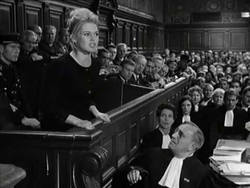
Voir l'extrait du film dans lequel l'avocat plaide l'innocence de sa cliente.
Henri-Georges Cluzot est un cinéaste qui utilise ici Brigitte Bardot, au sommet de sa célébrité, à contre-emploi.
Thesaurus : Doctrine

► Full Reference: L. Aynès, "How International Arbitration can reinforce the Compliance Obligation", in M.-A. Frison-Roche (ed.), Compliance Obligation, Journal of Regulation & Compliance (JoRC) and Bruylant, "Compliance & Regulation" Serie, to be published
____
📘read a general presentation of the book, Compliance Obligation, in which this article is published
____
► Summary of the article (done by the Journal of Regulation & Compliance - JoRC): The author takes as his starting point the observation that International Arbitration and Compliance are a natural fit, since they are both a manifestation of globalisation, expressing an overcoming of borders, with arbitration being able to take on the Compliance Monumental Goals, since it has engendered a substantially global arbitral order.
But the obstacle lies in the fact that the source of arbitration remains the contract, with the arbitrator exercising only a temporary jurisdiction whose mission is given by the contract. Yet the advent of the global arbitral order makes this possible, with the arbitrator drawing on norms that may include the Compliance monumental goals and corporate commitments. In so doing, the arbitrator becomes an indirect organ of this emerging compliance law.
The contribution then suggests a second development, which could make the arbitrator a direct organ of compliance. For this to happen, the arbitrator must not only compel the fulfillment of an obligation to act, as is already the case with provisional measures, but also have a broader conception of the conflict for which a solution is required, or even free himself somewhat from the contractual source that surrounds it. This may well be taking shape, mirroring the profound transformation of the judge's office.
____
🦉This article is available in full text to those registered for Professor Marie-Anne Frison-Roche's courses
________
Thesaurus : Doctrine
► Référence complète : S. Noël : "Regard sur une justice méconnue : la justice civile", conférence à l'Académie des Sciences morales et politiques, 2024.
____
________
Thesaurus : Doctrine
► Référence complète : B. Lecourt, "Des obligations d'information en matière de droit de l'homme et d'environnement au devoir de vigilance", in B. Lecourt (dir.) Lebvre - Dalloz, coll. "Thèmes et commentaires", 2025, pp
____
📗lire une présentation générale de l'ouvrage, Le devoir européen de vigilance, dans lequel cet article est publié
____
🦉Cet article est accessible en texte intégral pour les personnes inscrites aux enseignements de la Professeure Marie-Anne Frison-Roche
________
Thesaurus : Doctrine
► Référence complète : L. Grosclaude, "Financiarisation des professions libérales réglementées : vers un changement du paradigme", JCP Entreprise, n°49, déc. 2023, étude 1355.
____
🦉cet article est accessible aux personnes qui suivent les enseignements du professeure Marie-Anne Frison-Roche
________
Thesaurus : Doctrine

► Full Reference: J.-S. Borghetti, "The Relation between Tort Law and Compliance Obligation", in M.-A. Frison-Roche (ed.), Compliance Obligation, Journal of Regulation & Compliance (JoRC) and Bruylant, "Compliance & Regulation" Serie, to be published
____
📘read a general presentation of the book, Compliance Obligation, in which this article is published
____
► Summary of the article (done by the Journal of Regulation & Compliance - JoRC): The Author points out that in order to establish civil liability, it is first necessary to find fault, i.e. a deviation from an obligation, which will trigger a secondary obligation, that of reparation. But it can also be argued that it is from liability that this primary obligation arises, civil liability then revealing an obligation which existed only implicitly. That establishes a two-way relationship between liability and obligation. The Compliance Obligation illustrates this, in particular through the Obligation of Vigilance conceived by the French law of 2017.
The author therefore devotes the first part of his contribution to civil liability as a result of an Compliance Obligation, especially the Obligation of Vigilance. issued of the French law of 2017. After discussing whether the constraints generated by compliance should be classified as 'obligations', since there is no creditor, which therefore opens the way to liability in tort, he examines the conditions for incurring such liability, which are difficult, particularly with regard to the burden of proof and the demonstration of the causal link. The requirement concerning the latter may evolve in French law towards the admission of proportional causality, as is now accepted in certain cases in German case law.
In the second part of his contribution, the author deals with the hypothesis of civil liability as an indicator of a Compliance Obligation. He points out that the claims made, particularly in the cases of TotalOuganda (France) and Milieudefensie v. Shell (Netherlands) seek to obtain from the judge a such "revelation".
The author considers that it is not possible to draw from the French 2017 law which refers to article 1240 of the French Civil Code on the liability because this article is referred to only in order to organise the consequences of a breach of article L.225-102-4 of the French Commercial Code organising the Obligation of Vigilance (article 1240 being therefore under the secondary obligation described above) and not to feed what this article L.225-102-4 requires under the primary obligation (defined above).
On the other hand, the Shell judgment derives directly from civil liability an obligation to act. This is understandable if one takes the perspective and the measure of the future challenges posed, in this case in the area of climate change. But the author considers that it is up to the legislator to decide on such a development in Liability Law.
____
🦉This article is available in full text to those registered for Professor Marie-Anne Frison-Roche's courses
________
Thesaurus : Doctrine
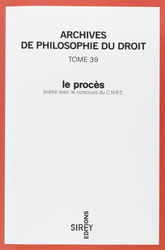
Complete reference : Archives de Philosophie du Droit (APD), Le procès, tome 39, ed. Sirey, 1995, 545 p.
Read the summaries of the articles in English.
See the presentation of other volumes of Archives de Philosophie du Droit.
Thesaurus
Référence complète : Grandjean, J.P., rapporteur, Rapport sur l'avocat chargé d'une enquête interne, Conseil de l'Ordre des Avocats, Paris, 8 mars 2016.
Thesaurus : Doctrine

► Référence complète : J.-Fr. Bohnert, "Les conditions de réussite de l'enquête interne dans les rapports entre le parquet national financier et l’entreprise mise en cause – l’enquête interne au soutien de la défense de l’entreprise", in M.-A. Frison-Roche et M. Boissavy (dir.), Compliance et droits de la défense. Enquête interne – CJIP – CRPC, Journal of Regulation & Compliance (JoRC) et Dalloz, coll. "Régulations & Compliance", à paraître.
____
📕consulter une présentation générale de l'ouvrage, Compliance et droits de la défense - Enquête interne, CIIP, CRPC, dans lequel cet article est publié
____
► Résumé de l'article (fait par le Journal of Regulation & Compliance - JoRC) : Dans une présentation très proche des lignes directrices du Parquet national financier (PNF) de 2023 et du droit souple produit avec l'Agence française anticorruption (AFA), l'auteur expose la façon dont l'entreprise doit dans un climat de confiance et de collaboration. Il s'agit pour l'entreprise de rechercher objectivement ce qui pourrait engager sa responsabilité pénale d'une façon transparente et loyale en gardant à l'esprit la collaboration possible dans la perspective d'une CJIP avec le PNF et la valorisation que celui-ci fait des diligences de l'entreprise dans la menée d'une enquête interne, de la même façon que des attitudes contraires sont logiquement considérés comme des éléments inverses dans le calcul.
____
🦉Cet article est accessible en texte intégral pour les personnes inscrites aux enseignements de la Professeure Marie-Anne Frison-Roche
________
Thesaurus : Doctrine

► Référence complète : S-M.. Cabon, "Théorie et pratique de la négociation dans la justice pénale", in M.-A. Frison-Roche & M. Boissavy (dir.), Compliance et Droits de la défense - Enquête interne, CIIP, CRPC, Journal of Regulation & Compliance (JoRC) et Dalloz, coll. "Régulations & Compliance", à paraître.
____
📕consulter une présentation générale de l'ouvrage, Compliance et Droits de la défense - Enquête interne, CIIP, CRPC, dans lequel cet article est publié
____
► Résumé de l'article (fait par le Journal of Regulation & Compliance - JoRC) : L'auteure définit la technique de "négociation" comme celle par laquelle "chaque interlocuteur va tenter de rendre compatibles par un jeu de coopération et de concessions mutuelles", ce qui va donc être utilisé dans la justice pénale française non pas tant par attraction du modèle américain, mais pour tenter de résoudre les difficultés engendrées par le flux des contentieux, le procédé s'étant élargi aux contentieux répressif, notamment devant les autorités administratives de régulation. Le principe en est donc la coopération du délinquant.
L'auteur souligne les satisfactions "pratiques" revendiqués, puisque les cas sont résolus, les sanctions sont acceptées, et les inquiétudes "théoriques", puisque des principes fondamentaux semblent écartés, comme les droits de la défense, l'affirmation étant faite comme quoi les avantages pratiques et le fait que rien n'oblige les entreprises à accepter les CJIP et les CRPC justifient que l'on ne s'arrête pas à ces considérations "théoriques".
L'article est donc construit sur la confrontation de "l'Utile" et du "Juste", parce que c'est ainsi que le système est présenté, l'utilité et le consentement étant notamment mis en valeur dans les lignes directrices des autorités publiques.
Face à cela, l'auteur examine la façon dont les textes continuent, ou pas, de protéger la personne qui risque d'être in fine sanctionnée, notamment dans les enquêtes et investigations, le fait qu'elle consente à renoncer à cette protection, notamment qu'elle apporte elle-même les éléments probatoires de ce qui sera la base de sa déclaration de culpabilité tandis que l'Autorité publique ne renonce pas encore au même moment à la poursuite étant problématique au regard du "Juste".
La seconde partie de l'article est donc consacrée à "l'Utile contraint à être Juste". A ce titre, l'auteur pense que l'indépendance du ministère public devrait être plus forte, à l'image de ce qu'est le Parquet européen, et le contrôle du juge judiciaire plus profond car la procédure actuelle de validation des CJIP semble régie par le principe dispositif, principe qui ne sied pas à la justice pénale.
________
Thesaurus : Doctrine
►Référence complète : Galli, M., Une justice pénale propre aux personnes morales : Réflexions sur la convention judiciaire d'intérêt public , Revue de Sciences Criminelle, 2018, pp. 359-385.
____
Thesaurus : Doctrine
► Référence complète : O. Dufour, La justice au temps du terrorisme. De Charles à Samuel Paty, préface de Jean Reinhart, postface de François Martineau, LGDJ-Lextenso Paris, 2025, 383 p.
____
►Les 7 procès relatés :
- sept.-déc. 2020 : procès des attentats de janvier 2015 (Charlie Hebdo) : p.15 - 83
______
Thesaurus : Doctrine
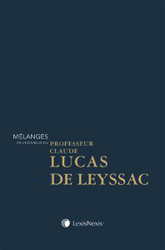
► Référence complète : P.-Y. Gautier, « Contre le droit illimité à la preuve devant les autorités administratives indépendantes », Mélanges en l'honneur du Professeur Claude Lucas de Leyssac, LexisNexis, 2018, p.181-193.
____
📘 Lire une présentation générale de l'ouvrage dans lequel l'article est publié
Thesaurus : Doctrine

► Full Reference: O. Douvreleur, "Compliance and Judge ruling only on points of Law", in M.-A. Frison-Roche (ed.), Compliance Jurisdictionalisation, series "Compliance & Regulation", Journal of Regulation & Compliance (JoRC) and Bruylant, to be published.
___
► Article Summary (done by the Journal of Regulation): Compliance maintains with the judge complex relations, and even more with the judge ruling only on points of Law (in France, the Court de Cassation in the judicial order, the one who, in principle, does not know the facts that he leaves to the sovereign appreciation of the judges ruling on the substance of the disputes. At first glance, compliance is a technique internalised in companies and the place occupied by negotiated justice techniques leave little room for intervention by the judge ruling only on points of Law
However, his role is intended to develop, in particular with regard to the duty of vigilance or in the articulation between the different branches of Law when compliance meets Labor Law, or even in the adjustment between American Law and the other legal systems, especially French legal system. The way in which the principle of Proportionality will take place in Compliance Law is also a major issue for the judge ruling only on points of Law.
____
________
Thesaurus : Doctrine
Référence complète : Lalande, P.-A., Le pouvoir d’injonction au service de la réparation du préjudice écologique : une mise en œuvre de l’office du juge administratif en matière climatique, Actu-Juridique, 9 décembre 2021.
____
_____
Editorial responsibilities : Direction de la collection "Droit et Économie", L.G.D.J. - Lextenso éditions (30)
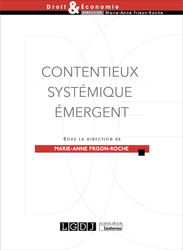
🌐follow Marie-Anne Frison-Roche on LinkedIn
🌐subscribe to the Newsletter MAFR. Regulation, Compliance, Law
____
► Full Reference: M.-A. Frison-Roche (ed.), Contentieux Systémique Émergent (Emerging Systemic Litigation), Paris, LGDJ, "Droit & Économie" Serie, to be published
____
📚Consult all the other books of the Serie in which this book is published
____
► General Presentation of the Book :
____
TABLE OF CONTENTS
Compliance and Regulation Law bilingual Dictionnary

The procedural guarantees from which the person benefits are mainly the right of action, the rights of defense and the benefit of the adversarial principle.
While the rights of the defense are subjective rights which are advantages given to the person at risk of having his situation affected by the decision that the body which is formally or functionally legally qualified as a "tribunal", may take, the adversarial principle is rather a principle of organization of the procedure, from which the person can benefit.
This principle, as the term indicates, is - as are the rights of the defense - of such a nature as to generate all the technical mechanisms which serve it, including in the silence of the texts, imply a broad interpretation of these.
The adversarial principle implies that the debate between all the arguments, in particular all the possible interpretations, is possible. It is exceptionally and justified, for example because of urgency or a justified requirement of secrecy (professional secrecy, secrecy of private life, industrial secrecy, defense secrecy, etc.) that the adversarial mechanism is ruled out. , sometimes only for a time (technique of deferred litigation by the admission of the procedure on request).
This participation in the debate must be fully possible for the debater, in particular access to the file, knowledge of the existence of the instance, the intelligibility of the terms of the debate, not only the facts, but also the language (translator, lawyer , intelligibility of the subject), but still discussion on the applicable legal rules). So when the court automatically comes under the rules of Law, it must submit them to adversarial debate before possibly applying them.
The application of the adversarial principle often crosses the rights of the defense, but in that it is linked to the notion of debate, it develops all the more as the procedure is of the adversarial type.
Compliance and Regulation Law bilingual Dictionnary

La présomption est une dispense de preuve lorsqu'elle est établie par la loi. Elle est un raisonnement probatoire lorsqu'elle est présentée devant un juge, raisonnement qui permet d'établir un fait pertinent à partir d'une preuve indirecte. Il constitue en cela un déplacement d'objet de preuve.
On distingue les présomptions légales, lorsque c'est le législateur qui a posé comme établi un fait, ce qui engendre alors non plus un déplacement d'objet de preuve, mais une dispense de preuve pour celui qui doit supporter normalement la charge de preuve.
Lorsque l'adversaire à l'allégation n'est pas autorisé à rapporter la preuve contraire à l'allégation, la présomption est irréfragable. Parce que la présomption irréfragable est une dispense définitive de preuve, elle soustrait la réalité d'un fait à l'obligation d'être prouvé. La présomption équivaut alors à une fiction. Parce qu'il s'agit d'un artefact, on affirme généralement que seul le législateur a le droit de poser des présomptions irréfragables. Ainsi, la présomption de vérité qui s'attache à la chose définitivement jugée est une présomption légale irréfragable. Celle-ci est alors une pure règle de fond, ici l'incontestabilité des décisions de justice contre lesquelles il n'existe plus de voies de recours d'annulation disponible.
A côté des présomptions légales, existent les "présomptions du fait de l'homme", expression traditionnelle pour désigner les raisonnements probatoires précités que les parties présentent au juge. Comme il s'agit de preuves véritables, ayant donc pour objet de reconstituer la vérité, elles ne peuvent pas être irréfragables, et ne peuvent entraîner qu'une alternance des charges de preuve, au détriment du défendeur à l'allégation. La présomption du fait de l'homme est toujours simple.
Si la jurisprudence établit pourtant des présomptions qu'elle pose comme incontestables, cela signifie simplement qu'elle a établie comme une règle de fond, comme la responsabilité des parents du fait des enfants, antérieurement une responsabilité pour faute présumée aujourd'hui une responsabilité aujourd'hui. Cela n'est que l'expression de la jurisprudence source de droit, c'est-à-dire de la jurisprudence au même niveau que le législateur.
____
Exemple concret
Une personne, A, est retrouvée blessée sur la chaussée. Elle prétend que l'auteur du dommage est le propriétaire d'un vélo qui a freiné brutalement et l'a renversée avant de prendre la fuite. Il n'y a pas de témoin. Elle soutient qu'il s'agit de son voisin, B, dont le vélo, est endommagé. Elle démontre qu'il existe sur le bitume des traces de peinture et de pneus, qui correspondent aux entailles du vélo de B., observation faite qu'il a changé ses pneus le lendemain même de l'accident.
A soutient le raisonnement suivant au juge : je dois démontrer que B m'a renversée (objet direct de preuve), ce que je ne peux faire directement. Mais je peux prouver que son vélo est endommagé, qu'il a changé les pneus, que les entailles du vélo correspondent aux traces relevées sur le sol où a eu lieu l'accident, que B a changé ses pneus le lendemain même de l'accident : on peut, par ces preuves indirectes, présume un lien de causalité. Ainsi, la preuve est apportée non directement, mais par raisonnement.
Si le juge admet le raisonnement, comme la présomption n'est pas irréfragable, la question probatoire ne sera pas réglée, il opérera simplement un renversement de charge de preuve. B, défendeur à l'allégation, sera recevable à démontrer que ces éléments, le changement des pneus, l'endommagement de l'ossature du vélo, ont d'autre chose. S'il apporte ces preuves, alors il aura brisé la présomption simple, et le demandeur, qui supporte le risque de preuve, aura perdu le procès. S'il ne les apporte pas, alors le demandeur, grâce à la présomption, aura gagné son procès.
_______
Thesaurus : Doctrine
► Référence complète : Association des professionnels du contentieux économique et financier (APCEF), La réparation du préjudice économique et financier par les juridictions pénales, 2019.
____
________
Thesaurus : Doctrine
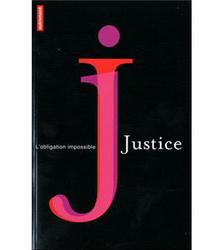
Référence complète : Lebovici, S., C'est pas juste, in Baranès, W. et Frison-Roche, M.-A., La justice. L'obligation impossible, coll. " Nos valeurs", Éditions Autrement, 1994, p. 16-27.
Consulter la présentation générale de l'ouvrage.
Consulter une analyse dans laquelle cet article est cité.
« Les étudiants de Sciences po peuvent lire l’article via le Drive de Sciences po en allant dans le dossier « MAFR – Régulation ».
Thesaurus : Doctrine
► Référence complète : D. Esty et M. Hautereau-Boutonnet, "Derrière les procès climatiques français et américains : des systèmes politique, juridique et judiciaire en opposition", D.2022, p.1606 et s.
____